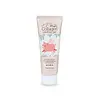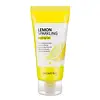What's inside
What's inside
 Key Ingredients
Key Ingredients

 Benefits
Benefits

 Concerns
Concerns

 Ingredients Side-by-side
Ingredients Side-by-side

Water
Skin ConditioningCellulose
AbsorbentDipropylene Glycol
HumectantGlycerin
HumectantHydrolyzed Collagen
EmollientHoney Extract
HumectantRoyal Jelly Extract
Skin ConditioningPropolis Extract
Skin ConditioningBiosaccharide Gum-1
HumectantButylene Glycol
HumectantCarbomer
Emulsion StabilisingArginine
MaskingXanthan Gum
EmulsifyingHydrated Silica
AbrasivePolysorbate 80
EmulsifyingEthylhexylglycerin
Skin ConditioningDisodium EDTA
Chlorphenesin
Antimicrobial1,2-Hexanediol
Skin ConditioningPhenoxyethanol
PreservativeParfum
MaskingWater, Cellulose, Dipropylene Glycol, Glycerin, Hydrolyzed Collagen, Honey Extract, Royal Jelly Extract, Propolis Extract, Biosaccharide Gum-1, Butylene Glycol, Carbomer, Arginine, Xanthan Gum, Hydrated Silica, Polysorbate 80, Ethylhexylglycerin, Disodium EDTA, Chlorphenesin, 1,2-Hexanediol, Phenoxyethanol, Parfum
Water
Skin ConditioningCetrimonium Chloride
AntimicrobialCellulose
AbsorbentPropylene Glycol
HumectantZanthoxylum Piperitum Fruit Extract
Skin ConditioningPassiflora Edulis Flower Extract
Skin ConditioningUsnea Barbata Extract
Carbomer
Emulsion StabilisingPolysorbate 80
EmulsifyingCitrus Limon Fruit Water
MaskingCitrus Limon Fruit Extract
MaskingCamellia Sinensis Leaf Extract
AntimicrobialAlthaea Rosea Flower Extract
Skin ConditioningAloe Barbadensis Leaf Extract
EmollientHamamelis Virginiana Extract
AntiseborrhoeicCentella Asiatica Extract
CleansingCarica Papaya Fruit Extract
Skin ConditioningHydrolyzed Collagen
EmollientSodium Hyaluronate
HumectantOryza Sativa Extract
AbsorbentFucus Vesiculosus Extract
EmollientBrassica Oleracea Italica Extract
AstringentPortulaca Pilosa Extract
Skin ConditioningJuniperus Oxycedrus Wood Extract
PerfumingCeramide AP
Skin Conditioning1,2-Hexanediol
Skin ConditioningDisodium EDTA
Parfum
MaskingWater, Cetrimonium Chloride, Cellulose, Propylene Glycol, Zanthoxylum Piperitum Fruit Extract, Passiflora Edulis Flower Extract, Usnea Barbata Extract, Carbomer, Polysorbate 80, Citrus Limon Fruit Water, Citrus Limon Fruit Extract, Camellia Sinensis Leaf Extract, Althaea Rosea Flower Extract, Aloe Barbadensis Leaf Extract, Hamamelis Virginiana Extract, Centella Asiatica Extract, Carica Papaya Fruit Extract, Hydrolyzed Collagen, Sodium Hyaluronate, Oryza Sativa Extract, Fucus Vesiculosus Extract, Brassica Oleracea Italica Extract, Portulaca Pilosa Extract, Juniperus Oxycedrus Wood Extract, Ceramide AP, 1,2-Hexanediol, Disodium EDTA, Parfum
 Reviews
Reviews

Ingredients Explained
These ingredients are found in both products.
Ingredients higher up in an ingredient list are typically present in a larger amount.
1,2-Hexanediol is a synthetic liquid and another multi-functional powerhouse.
It is a:
- Humectant, drawing moisture into the skin
- Emollient, helping to soften skin
- Solvent, dispersing and stabilizing formulas
- Preservative booster, enhancing the antimicrobial activity of other preservatives
Carbomer is a polymer of acrylic acid. Its main role is to create a gel consistency.
A high amount of carbomer can cause pilling or balling up of products. Don't worry, most products contain 1% or less of carbomer.
Cellulose is the main component of plant cell walls. It is used as an emulsifier, absorbent, and texture enhancer.
This ingredient has many functions:
Fun fact: Cellulose is the most abundant form of organic polymer on Earth.
Learn more about CelluloseDisodium EDTA plays a role in making products more stable by aiding other preservatives.
It is a chelating agent, meaning it neutralizes metal ions that may be found in a product.
Disodium EDTA is a salt of edetic acid and is found to be safe in cosmetic ingredients.
Learn more about Disodium EDTAHydrolyzed collagen has a misleading name because it is actually a mixture of various proteins/peptides. This ingredient has skin hydrating properties.
Collagen is the most abundant type of structural protein found in your body. In your skin, it is responsible for keeping it firm and youthful.
Hydrolyzed Collagen is created by breaking up proteins into smaller peptide bonds. These peptides act as humectants and emollients.
Humectants are great at holding onto water, keeping skin hydrated. Emollients create a thin barrier on the skin to prevent moisture from escaping.
There is ongoing debate about whether hydrolyzed collagen works because it increases skin hydration. Skin hydration is also linked to elasticity and the appearance of wrinkles.
Collagen or peptide ingredients can be used in the morning or night. They will not increase sun sensitivity, but you should always wear sunscreen during the day.
According to a manufacturer, this ingredient is a great hair conditioner as well.
This ingredient can be extracted from different sources, including:
Vegan collagen is derived from yeast, bacteria, or plant sources. Vegan collagen would go by a different INCI name, such as hydrolyzed soy protein.
The results are varied.
A study from 2021 found hydrolyzed collagen increased elasticity and improved wrinkles in 1,125 participants between age 20 and 70. Another study found increased skin thickness in participants between the ages of 45 to 59.
However, It is difficult to prove that oral collagen will end up working on your skin. Many of the studies using hydrolyzed collagen also add several vitamins and nutrients into the test mixture as well.
Further studies are needed at this time.
Learn more about Hydrolyzed CollagenParfum is a catch-all term for an ingredient or more that is used to give a scent to products.
Also called "fragrance", this ingredient can be a blend of hundreds of chemicals or plant oils. This means every product with "fragrance" or "parfum" in the ingredients list is a different mixture.
For instance, Habanolide is a proprietary trade name for a specific aroma chemical. When used as a fragrance ingredient in cosmetics, most aroma chemicals fall under the broad labeling category of “FRAGRANCE” or “PARFUM” according to EU and US regulations.
The term 'parfum' or 'fragrance' is not regulated in many countries. In many cases, it is up to the brand to define this term.
For instance, many brands choose to label themselves as "fragrance-free" because they are not using synthetic fragrances. However, their products may still contain ingredients such as essential oils that are considered a fragrance by INCI standards.
One example is Calendula flower extract. Calendula is an essential oil that still imparts a scent or 'fragrance'.
Depending on the blend, the ingredients in the mixture can cause allergies and sensitivities on the skin. Some ingredients that are known EU allergens include linalool and citronellol.
Parfum can also be used to mask or cover an unpleasant scent.
The bottom line is: not all fragrances/parfum/ingredients are created equally. If you are worried about fragrances, we recommend taking a closer look at an ingredient. And of course, we always recommend speaking with a professional.
Learn more about ParfumPolysorbate 80 is a surfactant and emulsifier. It is used to keep ingredients together, and prevent oils and waters from separating.
It is made from polyethoxylated sorbitan and oleic acid. This ingredient can be found in cosmetics, foods, and medicine. It is water-soluble.
Polysorbate 80 may not be fungal acne safe.
Learn more about Polysorbate 80Water. It's the most common cosmetic ingredient of all. You'll usually see it at the top of ingredient lists, meaning that it makes up the largest part of the product.
So why is it so popular? Water most often acts as a solvent - this means that it helps dissolve other ingredients into the formulation.
You'll also recognize water as that liquid we all need to stay alive. If you see this, drink a glass of water. Stay hydrated!
Learn more about Water